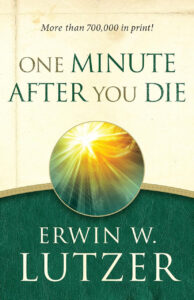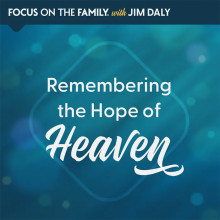Preview:
Dr. Erwin Lutzer: I said, “Lady, you have put me into a predicament because the question is this; Jesus spoke about Hell repeatedly, and you say that there is no Hell, so I have to choose. I don’t want to hurt your feelings, but I am going with Jesus on this one.”
End of Preview
John Fuller: Dr. Erwin Lutzer is going to share what the Bible says about death, the reality of Heaven and Hell, and God’s desire for you to live in eternity with Him. Thanks for joining us today for Focus on the Family with Jim Daly. I’m John Fuller.
Jim Daly: You know, John, when we talk about where we’re going to spend eternity, I think it’s hard for us to fathom how long that really is. I mean, even using the word long doesn’t make it because eternity is forever.
John: Mm-hmm.
Jim: Long seems to suggest point A to point B, right? This is point A and then it infinitely goes out.
John: Hmm.
Jim: And just thinking about that can kind of bend your mind about living for eternity. What does that even mean?
John: Hmm.
Jim: Uh. Death comes to all of us. Uh. You know, Jean gets uncomfortable. I talk to my boys about that. Whenever we pass the cemetery, this is true since they were little boys, I’d say, “Boys, everybody in that cemetery had one chance and they lived their life. You’re now living that life. Live it for the Lord.” “Okay, Dad.” And we’d move on. But they would say that’s the one thing I have been so consistent with is that it’s a point of demand to live once, and we’ve gotta decide what we’re gonna do with that life. In John 16:33, it says, “Take heart. I’ve overcome the world.” So we have the assurance of eternity in heaven with God through Jesus Christ, and the sacrifice that He provided through the cross. And this is what we call The Good News. And today we’re gonna talk about what happens in that one minute between this life and the next.
John: Hmm. And Dr. Erwin Lutzer is always a listener favorite. Uh. He’s been here a number of times and brings great biblical insight. He’s Pastor Emeritus of Moody Church in Chicago. Served there for, uh, about 36 years, I think, as Senior Pastor. Dr. Lutzer is a bestselling author. And, uh, Jim, you alluded to it. Uh. The book that we’re talking about today is One Minute After You Die. And, uh, this is a bestseller that you’ll wanna get a copy of and you’ll find it at FocusOnTheFamily.com/Broadcast.
Jim: Dr. Lutzer, welcome to Focus on the Family. Welcome back!
Erwin: So glad to be with you again, Jim. And, uh, as I’ve always mentioned, when I’ve been on, I’m so thankful for your ministry to so many people and helping them on their spiritual journey.
Jim: Yeah. I appreciate that. I mean, it’s been almost 50 years that Focus has, uh, been sitting in this role that the Lord created to help families thrive in Christ, and to do that first and foremost, with a foundation and belief in Him. Everything sits on that, right, marriage, parenting. Uh. I think it goes a lot better in this life when we know and trust the Lord. All right. Let me, let me ask you, uh, this is an interesting book. It says right on the cover more than 700,000 in print. There’s something that is very intriguing to people about this concept of the next life. Uh. People innately feel that it might be true, non-believer. I mean, there are other faith traditions. There are the, I would say the, uh, new age kind of thing that we’re, everybody’s kind of acknowledging that we’re spirit and we’re in these bodies, and then something happens at death. How would you say to that person that has their finger on the right thing, but maybe not in the right direction, meaning Jesus is the way, the truth, and the life? What would you say to them?
Erwin: Jim, you’ve asked a number of different questions in one single question, but first of all, I want to comment on the way you opened. The length of eternity…
Jim: Yeah.
Erwin: … we really can’t get our minds around it. I want people to visualize a measuring tape from here to the farthest star, the farthest star. And life on this planet for us is like a hairline. And then the tape extends for all of eternity. And here’s my burden, and this is why this program is so critical. I was in a place recently where there were a lot of wealthy people and these people are going along. They’re shopping. They’re in lovely homes. And I say to myself, I wonder if they give any thought to the fact that they are going to live forever. It seems as if only this life really matters. And they give very little thought to the next. You know, one day I was in a bookstore, and I saw the travel section. People were checking out books, you know, because they’re going to go to Europe, and they’re going to spend some time in some country of the world.
And they give almost no attention at all to the fact of where they are going to spend eternity. So there’s nothing more critical than the fact that you and I are going to die and we are going to live forever somewhere. And, uh, you know, your idea of going past a cemetery, I think that’s great what you do with your kids. You know, hey, that’s where you’re gonna end. You know, the statistics on death are very impressive. It’s about one out of one. (Laughter) And what you find is that there are so many people who deny it, and they don’t understand that we are going to be humiliated by our death, that on this side of the curtain it is an enemy. But on the other side of the curtain, for those who have faith in Jesus Christ, it is going to be a time of glorious reunion, a time of seeing Jesus Christ.
Jim: Yeah. Again, the appeal to this is broad. Beyond the Christian community, when we talk about life after death, and you can see it. There’s TV specials about it. There’s all kinds of interpretation about it. But I’m so grateful that you’ve written this book, One Minute After You Die. That’s something everybody should think about and, uh, and consider. In that respect, you had a story in there, I think, from Reverend Sanborn from Iowa that illustrates our closeness to heaven.
Erwin: You know, this is a remarkable story. Here’s a girl who’s dying and this pastor goes to visit her on a Saturday morning, and she looks up and she says, “The gate is open. I’m going to go in, but Mimi is going in ahead of me.” And then her head goes back on the pillow. A few minutes later, “I want to go in, but Gramps is going ahead of me.” Well, the pastor left and came back that afternoon and the girl had died. But he wondered who in the world was Mimi and who in the world was Grandpa? And so he did a study and discovered that Mimi was a girl who had moved to New York and Gramps was a friend of the family who had moved to a southern state. Now he was able to track them down and discovered that they both died that very Saturday morning. Now, think of that.
Jim: Yeah. Profound.
Erwin: You know, Heaven is as close as the next breath. I mean, you and I don’t know whether or not we’re gonna make it through this program. And so what we have to do is to realize that we’re talking about realities here. We’re speaking about that which is going to happen to us. And the question is, where will we be? And what form will we take?
Jim: Erwin, in fact, in the book you mentioned a conversation you had with a woman who claimed there was no hell. And maybe even asked, what is hell? What would you say?
Erwin: I have to tell you the way the conversation unfolded. So I’m sitting next to her, and I usually witness to the person next to me. And we got into a discussion, and she appeared to me to be very self-righteous. So even before that question came up, I said, “Would you consider yourself to be ungodly?” She said, “Oh no, I’m not ungodly.” I said, “I really feel sorry for you. That means you cannot benefit from the death of Christ because the Bible says that Christ died for the ungodly.” So that was like a bucket of water. But then we got into a discussion and she said, “Well, one thing I know for sure is that there is no Hell.” I said, “Lady, you have put me into a predicament. Because the question is this: Jesus spoke about Hell repeatedly, and you say that there is no Hell. So I have to choose. I don’t wanna hurt your feelings, but I am going with Jesus on this one.” So what you have to do is to always go back to the authority.
You know, there are those today who say that they had a near-death experience, and we can discuss those at some time. But what I like about Jesus is that He was not just near-death, he actually was dead. So what we must do is to recognize that we are up against the fact that Jesus is the one who can speak with authority. But now talking about Hell, I wanna say, first of all, Hell is just. You know, the reason that people react against Hell is they think it’s unfair. We have to believe that God is gonna do absolutely right by people. It’s very interesting that in the 16th chapter of Luke, where you have the man who finds himself in Hades, he did not complain about the injustice of it all. I believe that the justice of God is gonna be displayed because Hell is not the same for everyone by no means. People are gonna be judged on the basis of what they did with what they knew. Nobody is going to go to Hell because they’ve never heard of Jesus, if they’ve never heard of Jesus.
They will be judged on the basis of what they did with what they knew. Now, having said that, there’s no evidence in the Bible that they will be saved as a result of that. But their justice is going to be meted out accurately. So throughout all of eternity, we are going to sing, “just and true are thy ways, thou King of saints.” But Hell is a place of abandonment. It’s a place of torment even, the Bible speaks about where the wrath and the justice of God is displayed.
And the reason it is forever, and Jim, for me, this is chilling to say, but the reason it is forever is because people are forever guilty. So it’s not as if you somehow pay for your sin throughout all of eternity. So what we must do, and Jonathan Edwards did this, as you well know, the great theologian and the great preacher, when he preached on the subject of sinners in the hands of an angry God, we must warn people. It’s perfectly fine to warn them and to remind them that eternity is coming. And there are two places, there are Heaven and Hell and there is no in-between.
Jim: And you know, with Halloween just around the corner, Dr. Lutzer, uh, I think it’s important to touch briefly on the many dangerous avenues for contacting the other side, you know, reading cards or Ouija boards and kind of the dark side of the spiritual realm. Is there any legitimacy to those pathways for communicating with the dead? Or should we as Christians just stay far from that?
Erwin: Don’t ever try to communicate with the dead because what you’re going to end up doing is communicating with the demonic spirit who knew the dead. In my book, I give illustrations of this, of where I was, for example, on a plane, again, speaking to a woman who believed in reincarnation. And she said, “You know, I have never been to the state of Vermont, but I already knew what the house was like that I grew up in in the 1800s.” I said to her, “Do you know that there’s no such thing as the transmigration of souls, but there is a transmigration of demonic spirits and it’s a demonic spirit that enabled you to know what that house looked like?” She looked at me. Now we’re sitting together on the plane and she said, “I don’t talk to demonic spirits. I only talk to good spirits.”
And I said, “Well, how do you know the difference?” She said, “I receive only those spirits that come to me in light.” Well, what passage of scripture did I point out to her? The Bible says that Satan himself comes as an angel of light because Jesus is the light of the world. Obviously, Satan wanting to duplicate Jesus, he comes as light. And I helped her to see the importance of recognizing that she was deceived. So let’s be very clear out there. Don’t try to contact the dead. I have other stories that I could tell about people who contacted the dead and thought that they had spoken to their son, but actually they were speaking to a spirit through a medium, a spirit who knew their son.
John: Mmm. This is Focus on the Family with Jim Daly. And you’re listening to Dr. Erwin Lutzer as he shares from his deep theological understanding and uh, some of the content in his great little book, One Minute After You Die, get a copy of this book when you call 800 the letter A and the word FAMILY, or stop by FocusOnTheFamily.com/Broadcast.
Jim: You know, Dr. Lutzer, uh, as believers we often hear how could a good God send people to Hell? That’s a common question we encounter. And it, it, the way that it’s phrased is to make God seem lacking compassion. Like somehow, it’s His choice that people are going there, when in fact it’s our choice, right? He says, “Choose you this day, life or death.” And so for the person who knows and has heard the gospel and has rejected it, who’s the one choosing that location?
Erwin: You know, Jim, what we have to do is to recognize that God is God and we’re not. I have no doubt that there’s a tremendous amount of mystery connected with this. And we shouldn’t pretend that we have all the answers, but we have to deal with God the way He is and not the God that we would prefer. Our preference might be different, but the fact is that God has revealed Himself. And not only that, but there is also, of course, hope given, namely for those who believe on Jesus Christ and the opportunity to believe on Christ as you emphasized.
So we must realize that when it comes to these difficult doctrines, we must still bow to the authority of Scripture and not our own preferences. And um, in answer to your question, I want to say again that I believe that Hell is going to be just because it will be based on what people did with what they knew. Now oftentimes parents ask me about the age of accountability. You know, they have a child that is… dies and so forth. I think that there is really no age of accountability, very wisely because then we would be thinking, oh, here’s a child who’s now 12 or who’s a, here’s a child who’s 14. It’s not an age of accountability. It’s a state of accountability.
John: Mmm.
Erwin: The other day, really three days ago, I received a text message from someone whose child died who was mentally challenged. Well, even if the child was 15 or 20, they are going to be judged on the basis of their mental capacity. And so they will be judged as children. And there’s good evidence in the Scripture that what God does, because children are born as sinners, what God does is he places the payment of their debt upon Jesus who died for sinners and therefore they are saved on the basis of what Jesus Christ did. You know, even as I talk about this, the passage of Scripture that comes to mind is from Matthew chapter 18 where Jesus says, regarding children, “They behold the face of my Father who is in Heaven.” That puts them pretty close to the throne.
John: Hmm. Well that is really reassuring, and I appreciate that. Dr. Lutzer, in the book you talk about the personal nature of Heaven for the believer in Christ, I think you had four aspects to that personal nature. Can you describe those?
Erwin: First of all, John, before I describe that, I wanna point out to people that in Heaven there is communication. Your soul takes on the characteristics of the body so that when I die, I expect not only to see Jesus, but to see my parents and other relatives. But the final day of resurrection is still future. And the Bible says that, “We shall have bodies like onto His glorious body,” which is really again, unimaginable. Now what is Heaven going to be like? So often, John, I have a widow who says, “Do you think that my husband remembers me?” And I always smile, and I always say to her, “Do you actually think that your husband is going to know less in Heaven than he did on Earth? Of course he remembers you.” Knowledge continues, love continues, feelings continues, all of that continues in the heavenly realm.
Of course, the realm is different. The implications, of course, are there. And what is Heaven going to be like? Well, all that you have to do is to read Revelation, and you discover no more crying, no more death, no more pain. And here’s the interesting thing. The Bible says that God is going to wipe all tears from their eyes. Now the Greek text actually says, “God is going to wipe all tears out of their eyes.” It’s almost as if God is going to say, I’m going to get to the very heart of your sorrow, and I am going to be the one to dry your tears so that forever you will be with Me. And, of course, God is gonna have work for us to do. We’re gonna have various responsibilities given, various rewards dependent upon our faithfulness or lack thereof. And so all that we can do is to say, John, Heaven is so great that for the Christian, we should not really fear it.
Now, even those of us who write a book on death, we know that there’s anticipation. There are times of fear. But if our faith is in Christ, we need not fear. You know, there was a very well-known Christian leader who was dying, and he was going through all kinds of, uh, fearful thoughts. And people said to him, “Look at all that you’ve done. Look at the leadership. Look at the churches that you have pastored.” He received no consolation from that at all. And then someone said this, “Remember that you are accepted by God on the basis of the blood of Jesus Christ and His sacrifice.” And once he grasped that, he died in peace. So we must understand that really the basis is not our performance, however flawed or good it might be, it all has to do with Christ. And when we receive Him as Savior and trust Him, we are saved totally and completely on the basis of His merit.
Jim: Erwin, you and your wife, Rebecca, went to a grave site of a very famous person. I know who it is, but share with us what was on his tombstone and who was it?
Erwin: I was speaking in California and somebody said, you know, there’s a cemetery over there and Frank Sinatra is buried there. So with the help of a GPS, we found his grave. My first surprise is that it was not distinct from others. It was just as flat as other graves, which is interesting. But, Jim, on the tomb were these words, “The best is yet to come.” And I thought to myself, that’s a very interesting thing to have on your tombstone.
Jim: Mm-hmm.
Erwin: But I would say this, that if Frank Sinatra’s faith was not in Jesus, the best was not to come, the worst was yet to come. For the Christian, this is as bad as things will ever get because after we die, it’s gonna be a time of bliss and worship and service. For the non-Christian, it’s gonna be a time of gloom, of separation from God, and a time of suffering. And so the question is this: when you die, if you’re a believer, that’s a wonderful thing to have on your tombstone. The best is yet to come.
Jim: Yeah. I love that. I won’t want to copy that, I think, since he’s already done it, but that’s the kind of attitude I would want to put on my tombstone. Yahoo. Here we go. Uh. That’s just a great way to look at it.
Erwin: Mm-hmm.
Jim: Let me ask you in the end here, the last question, to speak to the person who doesn’t know the Lord, um, or is standing in prayer for some loved one who doesn’t know the Lord. How would you encourage them today?
Erwin: Well, first of all, to the person who doesn’t know Christ as savior, you’ve tuned into this broadcast. You’re marginally a Christian, but you’ve never put faith in Christ. Let me warn you that there is such a thing as false faith. False faith is only when you believe intellectually. Oh yes, Jesus is my savior. Jesus is the one who saves. But you have never personally received him, rejecting all reliance upon your own performance and recognizing that only Christ qualifies us for Heaven.
So I say that to you, to the person who’s praying for somebody who isn’t a believer, we can’t convert people. We can’t, I say to parents, you can’t convert your child. God has to do that. So what can we do? All that we can do is ultimately to entrust that person to God, trusting God to do what we can’t. When we expect somebody to believe on Christ, in effect, we’re asking the dead to rise, the deaf to here, and the blind to see. We can’t do any of those miracles. So we commit the person to God. We try to witness to them. Of course, at some point we may be stop, if it’s a child and he already knows the gospel, but he wants to go his own way, and we have to entrust him into God’s hands.
Jim: Dr. Lutzer, let me just say thank you. What a timely message for many of our listeners and viewers. And we don’t have to fear the chaos we see around us because we know the end of the story as believers, and it is good. And, uh, that one minute after death on this planet is the beginning of eternity for us. And what a great thought. If you’re feeling the urgency of this message, uh, get in touch with us, uh, with the gift of any amount. We’ll send you a copy of Dr. Lutzer’s great book, One Minute After You Die: A Preview of Your Final Destination, as our way of saying thanks for being part of the ministry. Let me read you an impact story. We don’t do this very often. We should do it more often. But here’s one we got recently. In fact, last week we had a listener named Mary write to us.
She said, “I’m praising God for Focus on the Family and your many other missions to families. Three generations of our family have been blessed with inspiration and positive advice on how to raise our children and our new grandchildren to love and serve Christ.” That’s generational impact. Three generations wonderful. And let me say, last year, Focus on the Family, we do survey work every year and we estimate that about 300,000 people came to Christ, uh, because of Focus on the Family. So the Lord is using us through the family to actually draw people to Him.
Erwin: Mm-hmm.
Jim: That’s eternity impact. And, uh, we are, so, I’m excited about that. I’m thrilled that Focus is being used by the Lord to draw people to Him. So be a part of it. It’s only about 1% of listeners that support the ministry. So way to go to that 1%, which you and I are both part of…
Erwin: Mm-hmm. Yeah.
Jim: … to support the ministry regularly. If you can do that, maybe we can move it to 2% and have even greater impact together. This accrues to your account, not to ours. We’re just, we’re gonna run it effectively and efficiently so you can do ministry through this tool, Focus on the Family, that God’s created. So use it.
John: Yeah. We’d love to hear from right away. So donate today and, uh, we’ll say thank you by sending a copy of the book we talked about today. One Minute After You Die, call 800 the letter A and the word family. That’s 800-232-6459 or donate at FocusOnTheFamily.com/Broadcast. And if you’re looking to learn more about heaven, uh, we have an amazing audio collection featuring our most popular broadcast called Remembering the Hope of Heaven. You’ll hear insights from Dr. Erwin Lutzer, Pastor Lee Strobel, Randy Alcorn, and others. It’s really an encouraging collection and it’s free. And you can learn more about it on our website or just give us a call. Again, our number 800, the letter A and the word FAMILY.
Jim: Dr. Lutzer, thanks again for being with us. Uh. If not on this side, I’ll see you on the other side.
Erwin: Thanks. Privilege to be here.
John: Thanks for listening to Focus on the Family with Jim Daly. I’m John Fuller inviting you back as we once again help you and your family thrive in Christ.


















